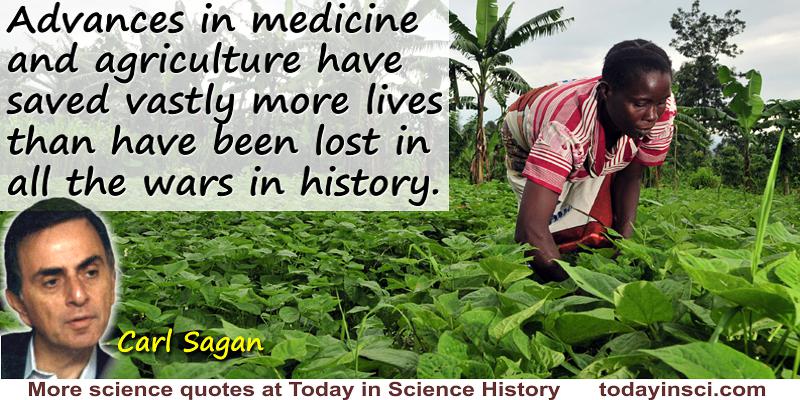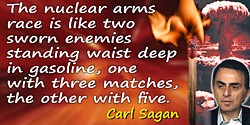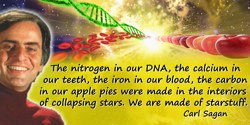 (source)
(source)
|
Carl Sagan
(9 Nov 1934 - 20 Dec 1996)
American astronomer, exobiologist and writer remembered for popularizing astronomy and science, especially with his public television series Cosmos. Its accompanying book spent seventy weeks on The New York Times bestseller list. He was an adviser to NASA for the Mariner, Voyager, and Viking unmanned space missions.
|
Carl Sagan
“Advances in medicine and agriculture”
Illustrated Quote - Large (800 x 400 px)
More Carl Sagan quotes on science >>
Carl Sagan in his book Demon-Haunted World named the first chapter, “The Most Precious Thing.” He begins by recalling a conversation in which he disabused an inquisitive man of his notions of extraterrestrials, Atlantis, astrology and such, about which he seemed well-read but uncritical. Although intelligent, the person with whom Sagan conversed was woefully uninformed of modern science. Too much pseudoscience snares the gullible. The problem, says Sagan, is:
So Sagan adeptly summarizes the advance of knowledge from the time of Hippocrates of ancient Greece to our modern successes for reducing infant mortality, epidemics and treating disease. He also acknowledges,
“I know that science and technology are not just cornucopias pouring gifts out into the world. Scientists … conceived nuclear weapons… Physicians in Tuskegee, Alabama, misled a group of veterans into thinking they were receiving medical treatment for their syphilis, when they were the untreated controls. The atrocious cruelties of Nazi doctors are well-known. Our technology has produced thalidomide, CFCs, Agent Orange, nerve gas, pollution of air and water, species extinctions, and industries so powerful they can ruin the climate of the planet.”
Sagan understands that “The sword of science is double-edged.” Yet, it still remains true that, on balance:
To illustrate his point about advances in medicine, which was the subject quote opening this page, Sagan provided a footnote:
“At a large dinner party recently, I asked the assembled guests - ranging in age, I guess, from thirties to sixties - how many of them would be alive today if not for antibiotics, cardiac pacemakers, and the rest of the panoply of modern medicine. Only one hand went up. It was not mine.”
- Science Quotes by Carl Sagan.
- 9 Nov - short biography, births, deaths and events on date of Sagan's birth.
- Carl Sagan - context of quote A Subject Called Chemistry - Medium image (500 x 350 px)
- Carl Sagan - context of quote A Subject Called Chemistry - Large image (800 x 600 px)
- Carl Sagan - context of quote “Advances in medicine and agriculture” - Medium image (500 x 250 px)
- Carl Sagan: A Life in the Cosmos, by William Poundstone. - book suggestion.
- Booklist for Carl Sagan.



![Carl Sagan quote: [Science] is not perfect. It can be misused. It is only a tool. But it is by far the best tool we have, self-c](https://todayinsci.com/S/Sagan_Carl/SaganCarl-MisusedThm.jpg)




